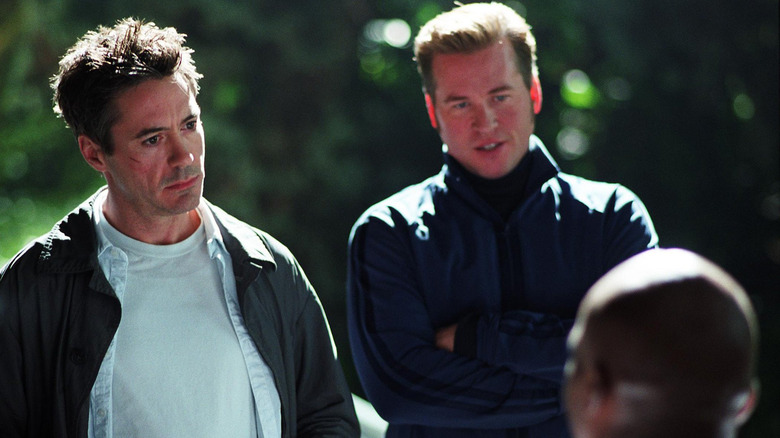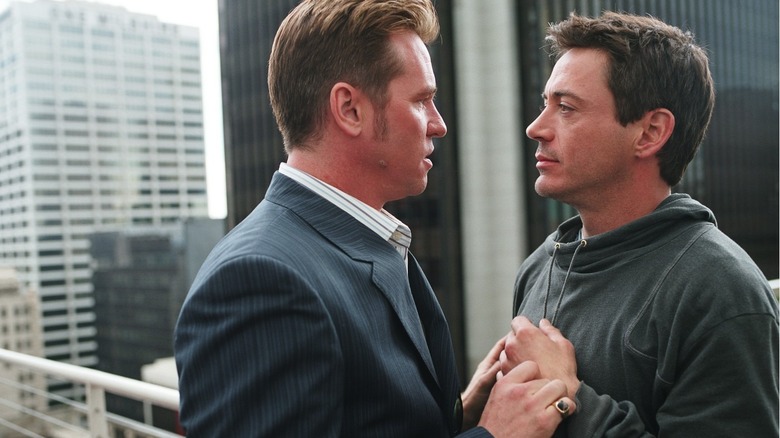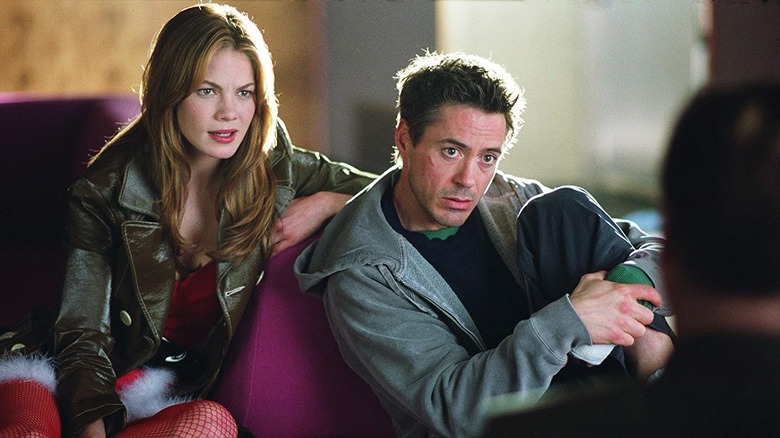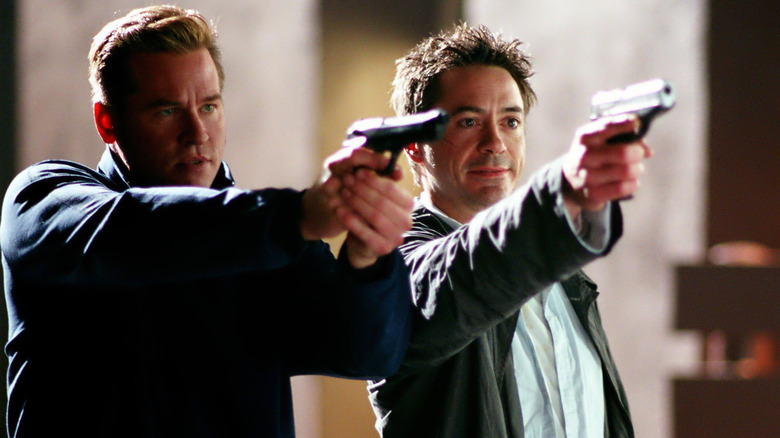Shane Black Saw Kiss Kiss Bang Bang As His 'Anti-Action Movie'
There was a time when Shane Black was the highest-paid screenwriter in Hollywood. His script for the 1991 film "The Last Boy Scout" famously fetched $1.75 million from the Geffen Company, with a $1 million guarantee. That price broke records and made Black an even hotter commodity than he already was. At that point, Black had already written the hit films "Lethal Weapon" and "The Monster Squad" while also doing uncredited punch-ups on "Predator," "Dead Heat," and "The Hunt for Red October." While riding high, Black's next film, John McTiernan's whimsical 1993 action fantasy "Last Action Hero" starring Arnold Schwarzenegger, bombed harder than anyone might have imagined. On a rather huge budget of $85 million, the film ultimately only grossed $137 million worldwide.
Black returned with another record, having earned a whopping $4 million for his script to Renny Harlin's 1996 action film "The Long Kiss Goodnight." While a raucous and exciting action film, "Long Kiss" also bombed, earning $89 million on a $65 million budget. That, it seemed, was enough to force Black into a hiatus, and he didn't have any screenplays produced for nearly a decade.
In 2005, however, Black returned with a stripped-down, inexpensive neo-noir comedy film called "Kiss Kiss Bang Bang," which he directed himself. His new film was about a bumbling cat burglar named Harry (Robert Downey, Jr.) who stumbles quite by accident into being cast as a detective in a big-time Hollywood movie. Rolling with the mistake, Harry accepts a "detective coach" in the form of a real P.I. named Perry (Val Kilmer). Harry and Perry hate each other, naturally, and just as naturally find themselves embroiled in a dark case full of murder and Hollywood betrayal.
Harry and Perry
Black, coming off his long series of large-scale action comedies, was clearly trying to take a new tack with "Kiss Kiss Bang Bang." The screenwriter's propensity for bubbly dialogue, witty characters, and lightly antagonistic friendships/relationships was now, in this case, wrapped around the genre trappings of film noir. In a 2005 interview with the website Chud, Black was explicit about how "Kiss Kiss" was meant to be an antidote to his usual action fare. Indeed, when asked about the usual action clichés one might see in movies, Black said he was determined to undermine a lot of them. In his words:
"I'm sure there are several that I've yet to get to. It was kind of the anti-action action movie in the sense that I tried to make everything ... all the tough guy stuff ... and put it on its ear a little bit. The violence in it and the action is very awkward. People are stumbling, the wrong person is shooting. Instead of this guy, it's the vendor who shoots the bad guy at one point. I liked that the actual guy who is tough and knows how to kick down the door and rescue everybody happens to be gay."
Perry, Kilmer's character, is a capable detective, the smartest person in the film, and a gay man. Queerness, Black seems to acknowledge, is rarely included in action movies, with a certain kind of ultra-hetero machismo often expressed instead. Black satirized that kind of sexual bluster in portions of "Predator" wherein a character uses a queer slur before referring to himself as a "sexual tyrannosaurus." It's an evocative phrase, but also comedically meaningless. Later in the film, his confident toxicity will be rendered into a paste by an alien monster.
Tough guys
So then, "Kiss Kiss Bang Bang" wasn't just an anti-action film, but a winking deconstruction of overused masculine tropes that too often play a key part in action cinema. Black goes on to say that "tough guy" characters so often seen in the genre, in fact, predate what we might now call action pictures. Black feels that something like "Kiss Kiss Bang Bang" gets back to the character-driven origins of action as he recalled it from the cinema of the 1960s and 1970s. He said:
"It's interesting to me to take everything I love about tough guy movies and sort of conjure those elements and play with them. Just because I think that the only time I can do that is when there's a genuine love for the material in the first place. I mean, there's such fondness, and I hope it shows, for this kind of movie, the sorts of movies that evolved from say 'Dirty Harry,' 'Point Blank,' 'Night Moves', 'Bullitt,' 'French Connection,' 'The Seven-Ups.' I can name these '70s type movies that for me were the template for making a good thriller."
He also says that he prefers the word "thriller" over "action," as many of the films listed aren't necessarily notable for their action as they are for their tension, actors, and characters. "Bullitt" and "The French Connection" both feature notable car chases, but they are not wholly "car chase movies."
Is it even action?
The interviewer asked Black what even defines "action" as a genre and the filmmaker became thoughtful about genres at large. He pointed out that many of the most thrilling films of previous generations weren't action-forward. He cites his favorite Alfred Hitchcock film as an example of a pulse-pounding blockbuster that, well, would not be found in the action section at Blockbuster. He was talking about an Oscar-winning Cary Grant thriller from 1959:
"[In] 'North by Northwest' you've got a plane crashing and blowing up an oil tanker, you've got people falling off of Mount Rushmore, but I don't think anybody refers to that as an action movie. It's a suspense piece. Not only is it a good question but it's also a pet peeve of mine in that I think that what pleases me is that I think movies are steering more towards character driven scripts that seem more like thrillers than action movies where you can't just cast a wrestler."
The wrestler Black is likely referring to is Jesse Ventura, the aforementioned sexual tyrannosaurus.
The characters in "Kiss Kiss Bang Bang" are what drive its drama. They bicker and argue twice as often as they slip out of tough scrapes. "Kiss Kiss" was not an overwhelming hit at the box office, but it has accrued a passionate following of fans in the 17 years since its release. It also led to a working relationship between Black and Robert Downey, Jr., who would work together again on "Iron Man 3," one of the better films to come from the Marvel Cinematic Universe.
Black, it seems, is equally happy to make smaller character pieces as enormous action blockbusters. He is, luckily, adept at both.



